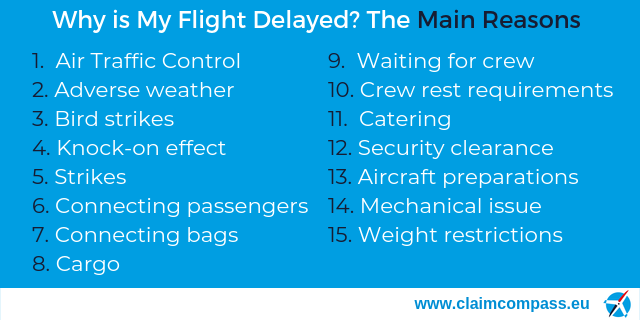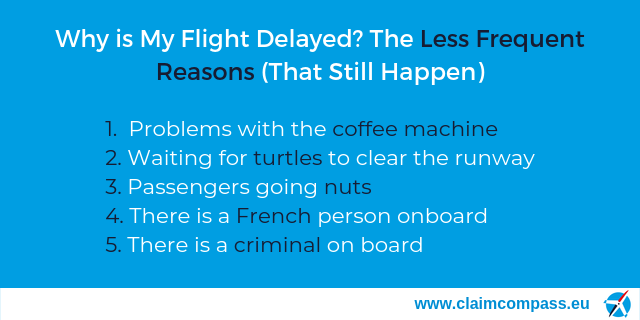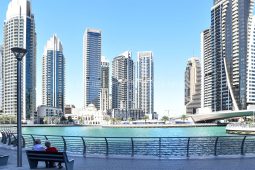Why is My Flight Delayed? The 20 Main Reasons for Flight Delays

You’re ready to fly off to your destination when the flight schedule board at the airport breaks the news to you:
Your flight is delayed.
Without a doubt, you’re first going to be frustrated – although not necessarily surprised.
Then, you’re going to wonder: why is my flight delayed?
In this post, we detailed the 20 most common (and not so common) reasons for flight delays.
Chances are, one of them is the cause of your flight disruption – but on the bright side, you might get flight delay compensation
Made with InVideo.io
Table of Content:
Why are flights delayed?
The most common reasons for flight delays
Other (less frequent) causes of flight delays
How to find the real reason your flight was delayed
Track your flight to know why it is delayed
Why are flights delayed?

Operating a flight is challenging on so many different levels, largely because of all the different people involved.
On the one hand, there are factors that are under the direct control of the carrier, such as aircraft turnarounds between flights, passenger punctuality, technical and crew performance, etc.
On the other hand, there are perhaps even more factors that are outside of the airline’s control, such as weather, air traffic control, security, airport conditions, etc.
The reality is such that so long as airplanes continue flying, flight delays will be a part of the experience. According to the Bureau of Statistics, about 20% of all flights are delayed by 15 minutes or more.
(During our airline ratings case study, we found that it’s closer to 24.30%)
Let’s start with the 15 most frequent reasons for those delays.
The most common reasons for flight delays

1. Air Traffic Control (ATC) restrictions
Since the 80’s, air passenger traffic has grown from half a billion to well over three billion passengers a year.
That is a lot of airplanes in the skies carrying a lot of people at any given point. And most of this traffic is concentrated around just a handful of hubs, such as London, Paris and New York.
Longer flights also come with more restrictions and regulations, with airlines often changing their routes at the last minute due to weather and jet streams. The latter gets even more complicated because of airlines’ effort to be cost effective and optimize their fuel efficiency.
Infrastructure is another issue:
Certain areas of the world do not get the same radar coverage as Europe or the United States, for example. This forces air traffic regulators to require larger periods of time between take offs and landings to ensure safety, which easily turns into a chain reaction if one or more flights are delayed.
In case you’re wondering, when your flight was delayed or cancelled due to air traffic restrictions, you are not eligible to compensation, since the decision has to be respected by the airline. It’s part of the extraordinary circumstances clause under EC261/2004 Regulation, which exonerates them from liability.
2. Adverse weather conditions
Different airports have different standards when it comes to delays caused by adverse weather conditions, usually determined by national regulatory bodies such as the Federal Aviation Authority (FAA) in the US, for example.
Adverse weather conditions are often cited as one of the main reasons for flight delays, however they are not as common as most people think. That is because even if the weather does not appear to be optimal, it is not a given that the flight cannot be operated on time.
When we speak of adverse weather conditions impacting the performance of a flight, we’re mostly speaking of extreme weather conditions – i.e. tornadoes, blizzards, hurricanes, etc – which typically account for only about 6% of all flight delays.
What this means in practice is that even though airlines often cite bad weather as the reason for a delay, that is more often than not, not the actual reason.
It’s also why you could be entitled to a compensation even if the airline told you that the flight was delayed due to bad weather.
In order to determine if weather was indeed the reason for a flight delay, we look at something called METAR reports. The latter are a format of reporting weather information used in aviation. These reports contain various information, including temperature, dew point, wind direction and speed, precipitation, cloud cover, visibility and barometric pressure.
The information is encoded and needs to be decoded and analyzed in order to understand whether or not a flight could have been operated on time. That’s why passengers let Service take care of their claim: we have the technical expertise to check whether your flight was facing adverse weather conditions or not, and the legal team that can make the argument when the airline isn’t cooperating.
3. Bird strikes
Sometimes, a flight can be delayed as a result of a collision between an aircraft and an airborne animal (usually a bird).
In aviation, these events are called “bird strikes”, or more rarely “bird hits”.
Unlike what you may expect, they are not that rare an occurrence: there are on average about 13,000 bird strikes per year in the US alone.
Most of these strikes happen during takeoff and landing. While they typically cause little damage, they are nevertheless regarded as a security threat.
Why do bird strikes cause flight delays?
Security protocol requires airlines to perform a particular set of procedures following a bird strike, which may impact its on-time performance. This may result in what’s called a “rotational delay” or a “knock-on effect”, which we’ll look into next.
When it comes to EC261 claims for compensation, while the European Court of Justice deemed bird strikes as extraordinary circumstances in which no compensation is due, the airline cannot deny a claim without proving that it did all within its control to reduce the impact on subsequent flights.
4. Knock-on effect due to a delayed aircraft
A knock-on effect is the main cause for what’s also known as rotational delay – i.e. when a flight is delayed because of the late arrival of an aircraft.
Since airlines are optimizing the utilization of their fleet, it is not uncommon that your flight may be delayed because the aircraft which is supposed to operate your flight has been delayed on its previous route.
It is important to specify, however, that knock-on effects do not automatically exonerate the carrier from liability to pay compensation under EC261/2004.
A claim can be denied on grounds of knock-on effect delay only if the delay was caused by what’s considered an extraordinary circumstance and the effect of the disruption cannot be extrapolated indefinitely, but is capped at 24h post the original event.
Too complicated? To put it simply:
If you’re flying on Friday on an aircraft which was operating a flight on Monday and happen to experience a bird strike, which affected the entire schedule going forward, the airline cannot cite the knock-on effect as a reason to reject your claim.
5. Strikes
Just like in most industries, airline staff can decide to go on strike to leverage labor power and enter into negotiations with their employer.
The impact of these strikes can be minimal just like it can completely cripple the business and cause enormous expenses to the airline.
For example, in September 2019, British Airways pilots decided to go on a 48 hour strike, which affected hundreds of thousands of passengers. To many, these strikes are ill-understood and unleash a wave of discontent (and rightly so) among affected passengers.
However, if one was to consider the dynamics of an industry which relies almost entirely on a workforce of specialists, it becomes clearer that staff does have a considerable amount of negotiation power.
At first sight, a strike is considered an extraordinary circumstance and no compensation is due if your flight has been affected. That being said, there are certain exceptions, which need to be considered. If a flight does not fall within the immediate strike period, but is disrupted, then the carrier cannot invoke the extraordinary circumstances clause and must honor your claim.
6. Waiting for connecting passengers
In certain cases, the airline may slightly delay the flight in order to board connecting passengers.
As a general rule of thumb, carriers will not wait for connecting passengers. However, they seem to approach this on a case by case basis.
For example, if there aren’t other passengers who will be impacted and won’t miss their connection, or if the connecting passengers’ bags have been already loaded and unloading them will take longer than the anticipated wait time for them to board, then the first officer may decide to wait for them.
Other circumstances which may lead a flight to wait for connecting passengers is if their slot time has been pushed back and will end up being delayed anyway.
7. Waiting for connecting bags
When passengers having one or multiple connections are traveling with checked-in luggage, it must also be transferred onto their next flight. In some cases this may be the reason for a minor flight delay as ground handling will require a bit more time transferring the luggage.
Just like the case of waiting for connecting passengers, this will be treated on a case by case basis. That being said, it is highly unlikely that a flight will be delayed several hours because ground handling is transferring luggage.
8. Waiting for cargo
Commercial airlines are not only carrying passengers and their luggage. In fact, cargo makes up between 5 and 10% of their total revenue.
One of the most common examples is the US Postal Service which leases cargo space on 15,000 out of the 25,000 commercial passenger flights. Hence, a flight can sometimes be delayed because of the late arrival of freight.
Again, we’re probably not talking about a major delay of 4 hours being caused by delayed cargo, but it isn’t uncommon for a small deviation from schedule to be the result of just that.
9. Waiting for crew
Typically, a flight cannot take off if it doesn’t meet the required number of crew, which is somewhere around one flight attendant per 50 seats. In fact, passengers cannot begin boarding, unless that requirement has been met.
As a result, your flight can be delayed if the crew hasn’t arrived yet (which is not that uncommon).
For flights departing from an airline’s hub or typically out of a busy airport, such as Paris or London, however, this is not that common, as the airline probably has crew on staff. In certain other situations, however, there’s a chance that the crew may be arriving from another destination, and if that flight is delayed, so will be the crew.
It is not impossible for a flight to be delayed by several hours if the crew is late. As these situations fall within the carrier’s control, passengers are entitled to claim compensation.
10. Complying with flight crew rest requirements
Regulations are set in place to ensure that members of the crew, meaning pilots and flight attendants, are well rested before the flight. Sometimes the crew may max out their hours because of scheduling difficulties or a rotational delay (a flight, which was delayed because of the late arrival of a previous flight).
In these situations, unless the airline can replace the crew, there’s a good chance that the plane will be grounded.
Just like in the previous case, these circumstances fall within the carrier’s control (i.e. ensuring the appropriate scheduling, having crew on stand-by, etc) and do not exonerate them from liability. Hence, according to EC261/2004 if your flight has been delayed because the crew maxed out its hours, then you are entitled to compensation.
11. Waiting for catering
Another less known reason which may cause the delay of a flight is waiting for catering. The latter does not only include food, but also utensils, service ware, hygienic and miscellaneous items for assisting passengers.
All of the above are managed by an airline catering agent, which is responsible for all aspects of catering line operations, such as loading and unloading equipment and supplies, driving large catering trucks, managing inventory, etc. Obviously, there are a lot of moving parts involved and things sometimes don’t go as planned, which may cause an additional delay.
Again, just like in the previous paragraphs, if that is the case, the airline cannot be exonerated from liability even if catering is managed by a third party service provider and must pay compensation if the flight falls within EC261/2004 Regulation.
12. Getting security clearance
The list of things that need to happen before the engines of an aircraft are even turned on is long. In summary, some of the major events that take place are:
- The pilots prepare the aircraft for take off
- Crew closes the doors and Air Traffic Control (ATC) is contacted
- ATC will either immediately or after some time give clearance for pushback and startup
- ATC specifies the taxiway, however, pilots stay clear of runway
- Finally, ATC clears to enter runway and the aircraft begins takeoff
Needless to say, there are a lot of things that have gone in preparation for each and every step and that will determine whether or not the aircraft can take off on time. For example, airline dispatch and operations control will decide and plan the route, which the aircraft will take, considering the weather conditions, fuel capacity, passenger load, etc.
These security requirements are split between factors, which are within the airlines control and those who aren’t. That may have an impact on whether or not the delay of the flight would qualify under EC261/2004 for compensation.
13. Preparing the aircraft
The preparation for take off of your aircraft begins as soon as it lands. Some of the main activities are :
- Hooking up the aircraft to a ground power system so there’s power to power the AC
- Loading the catering and disposing of used galley carts
- Cleaning the toilets and the entire aircraft
- Refueling
- Preparing for pushback
- Boarding
Once again, there are a lot of things that can delay the preparation of the aircraft, and consequently, its take off on time. Something as simple as not having the aircraft cleaned on time because of lack of staff, could have an impact on the boarding time, which can result in a flight missing its slot, etc.
It is rather rare (but not impossible) for a flight to be delayed by several hours because of issues surrounding preparation.
14. Fixing a mechanical issue
Aircrafts are subject to very strict technical maintenance and rightly so. It is not uncommon for a flight to be delayed because of a technical issue which requires immediate attention.
While this does sound scary, most of the time it poses no risk to passengers and is relatively easy to repair.
Some of the most common issues that occur before take off are related to:
- Aircraft parking issues
- Problems with the water draining system during winter
- Contamination of the air conditioning system
- Issues with the engine fan blades
- Fuel contamination
Again, these may sound scarier than they actually are.
When it comes to flight delays caused by a technical malfunction which requires immediate attention, the EC261/2004 Regulation is clear that passengers are entitled to compensation.
Similarly, the Department of Transportation in the US also states that a technical issue, even if it is extraordinary, does not exonerate the carrier from liability.
15. Complying with weight restrictions
Every airplane has something called maximum takeoff weight (MTOW), which is the combined weight of cargo, passengers and their luggage, fuel, catering, etc. If an airplane exceeds that weight, it cannot take off.
What’s even more interesting is that this isn’t a constant number – it depends on things like atmospheric conditions and elevation. So an aircraft taking off at sea level will have a different MTOW than an aircraft taking off at a higher altitude.
This is yet another reason for a delay, or even worse – a boarding denial. Luckily, just like the technical issue, it does not qualify as extraordinary circumstances and the airline must pay compensation.
Other (less frequent) causes of flight delays

16. Problems with the coffee machine
This may come as a bit of a surprise, but coffee machines on board of aircrafts are quite different than the ones we’re used to in our daily lives. They are made in a way which allows water to boil properly even at high altitudes and the electric circuit is only compatible with that of an airplane.
The Federal Aviation Administration in the US and the European Union Aviation Safety Agency require coffee makers to have safety features to prevent fires caused by electrical malfunctions. Should a coffee maker go out of order, then much like the technical issues which we previously mentioned, it must be fixed before take off.
Unfortunately for you, this sort of delay is considered to be the responsibility of a third party, not the airline. As a result, you won’t be compensated for arriving late.
17. Waiting for turtles to clear the runway
This is an actual reason. No joke.
JFK airport in New York will occasionally become the private passage for turtles which are headed to lay their eggs in Jamaica bay. In 2016, for example, the Port Authority of New York reported that over 500 turtles have been carried off the JFK runways and returned to their natural habitat.
While it isn’t clear what attracts the turtles to the airport runways, some scientists believe that it has to do with the sand surrounding the airport, which is at a natural elevation above the tide, and therefore a safe place to lay eggs.
Needless to say, there’s no compensation in such cases, but it makes one hell of a story.
18. Passengers going nuts
Here we’re referring to the infamous nutgate incident, also known as “nut rage incident”, which took place on a Korean Air flight at JFK airport a few years back.
In a nutshell (pun intended), Korean Air Vice President was travelling in first class when peanuts were served in their original packaging instead of a plate. The horror, right?
Apparently, this caused the VP of the airline to lose her cool and assault one of the crew members, which resulted in a 12 month prison sentence for obstructing aviation safety.
It is not uncommon for unruly passengers to interfere with the normal operations of a flight, in which case no compensation can be claimed as the latter are considered circumstances outside of airline’s control.
19. There is a French person on board
Similarly to the previous point, the French can be a handful (full disclaimer: I’m French, I can say that).
Luckily, being a famous actor does not absolve one from the rules. After embarking for his flight to Dublin, one of France’s most prominent actors, Gerard Depardieu felt the sudden urge to relieve himself. With the seatbelt sign on and right before take off, he was naturally denied access to the restroom.
Mr. Depardieu’s course of action from that point on involved a bottle and a not so elegant relief. This resulted in grounding the airplane for an extra 2 hours.
Unfortunately, this wasn’t the airline’s responsibility: the passengers were not eligible to compensation, although they arrived late at their final destination and most likely – in distress.
20. There is a criminal on board
Don’t freak out, but if you’re reading this at the airport, the guy next to you may be involved in illegal business and wanted by the police. Granted, you’re probably more likely to win the lottery. Hopefully.
But this is true, though:
During a flight from Washington to Beijing, the plane had to turn back around so that the FBI could apprehend a kidnapper.
Again, if that happens to you, you’re probably one of the unluckiest people on earth. I would not go out when there’s thunder if I were you.
How to find the real reason your flight was delayed
Start by asking information to the airport staff. It is your right to know why you won’t be departing on time.
If you’re likely to reach your destination 3 hours late, or miss your connection because of the delay, you can even ask a flight delay certificate as proof. This will come in handy when you claim a compensation for delayed flight.
The problem?
Information provided by the airport staff isn’t always accurate.
Worse: the airline sometimes lie about the cause of the delay to avoid paying compensation.
Do some research on your own to find out if other planes were delayed at your departure airport, and if there were delays at the arrival airport, or if your flight was an isolated case.
The problem, this time, is that it might be hard to find access to this kind of information.
If your flight was delayed, you can entrust your compensation claim to Service:
- we have the tools to determine the real reason of your delayed flight
- we automatically file a claim when we detect the reservation of a delayed flight in your inbox
- the average traveler saves $300 on average with Service
Track your flight to know why it is delayed
We’ve already mentioned some of the best live flight trackers but here’s a summary:
Flight tracker for US flights
Several tools exist to help you determine why your US flight is delayed. One of them is Flightview: it lets you track your flight or a specific route to know your flight status.
The FAA also has this cool map that lets you visualize flight delays across the US, by providing an overview of conditions in US airports.
Flight tracker in Europe
There are no equivalent to the FAA’s map in Europe. The best option is to track your flight from the airline or the airport’s website.
Depending on the reason for the delay, you may or may not get compensated
No matter the reason for your flight delay, it will put your journey on hold.
But at least, if it’s the airline’s responsibility, you might be able to turn this bad experience into something a bit more positive.
Flight delayed because of coronavirus? Unfortunately, you won’t be eligible for compensation. Take a look at those guides to know more about travelling in COVID times:




